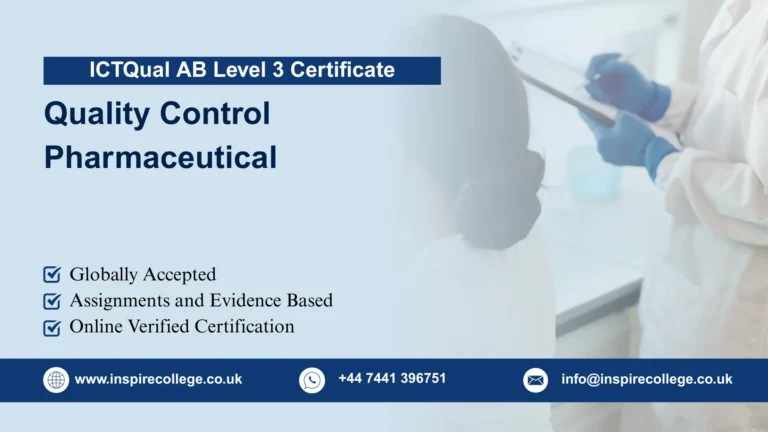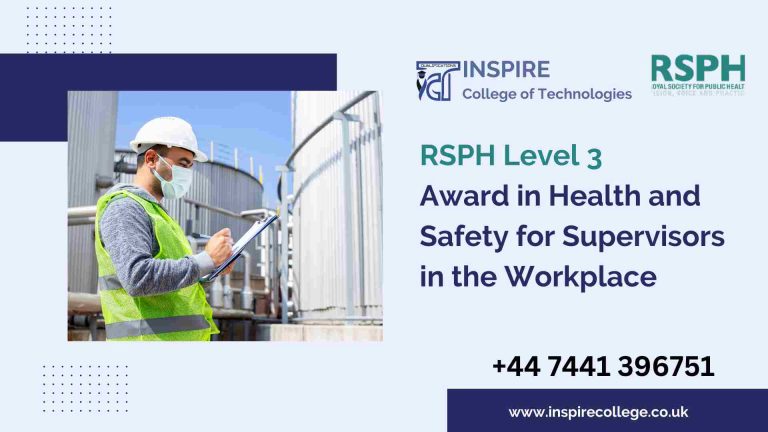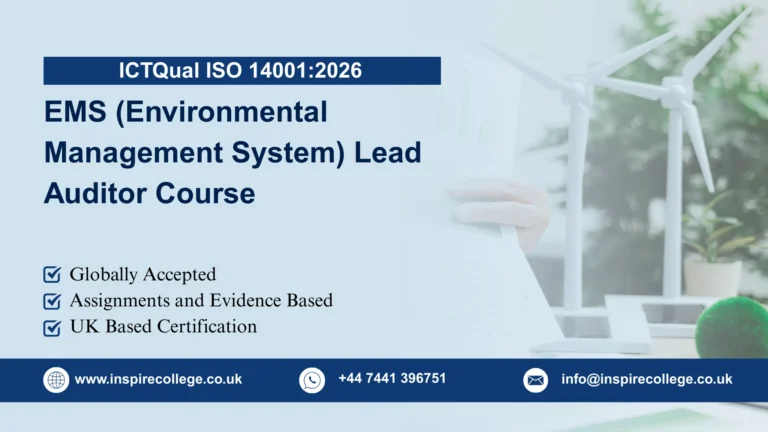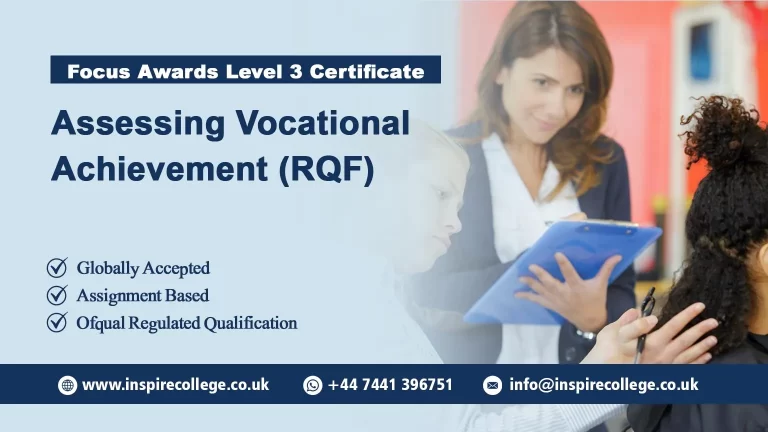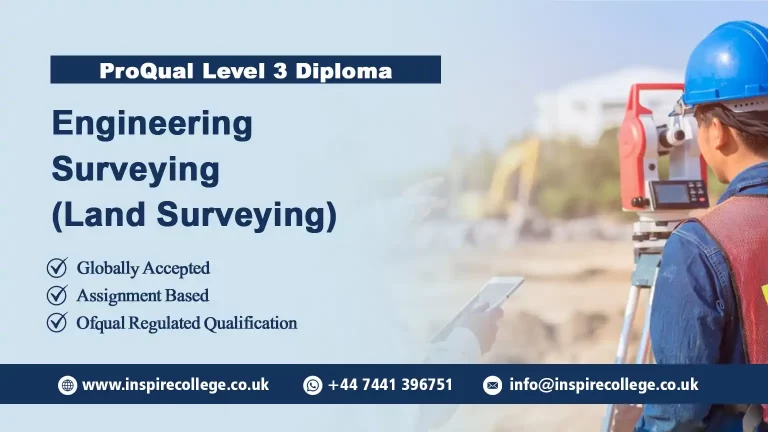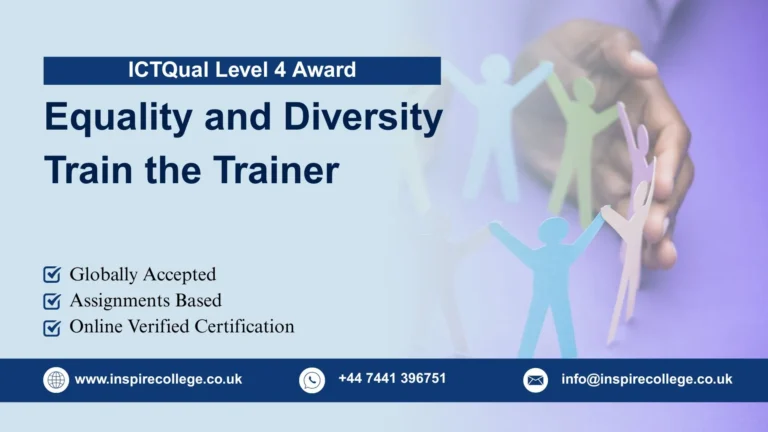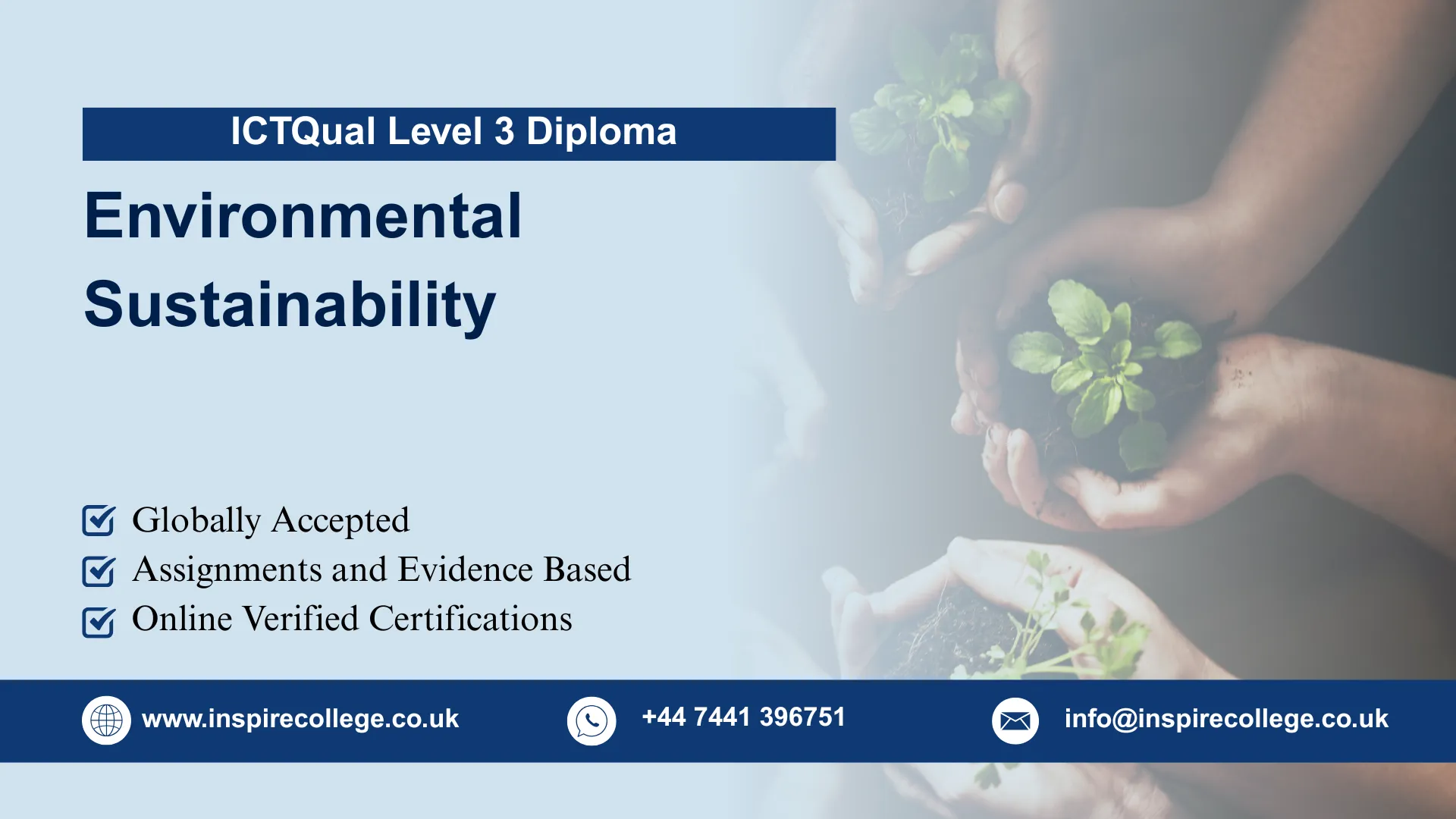
ICTQual Level 3 Diploma in Environmental Sustainability
Environmental sustainability has become one of the most critical global priorities, shaping policies, business practices, and societal behaviors. The ICTQual Level 3 Diploma in Environmental Sustainability provides learners with an in-depth understanding of sustainable practices, environmental management systems, and strategies to mitigate ecological impact. This qualification equips professionals with the knowledge and practical skills needed to address environmental challenges in diverse industries and organizations.
The purpose of ICTQual Level 3 Diploma in Environmental Sustainability is to develop expertise in key areas such as resource management, waste reduction, renewable energy, environmental legislation, and sustainable development strategies. Learners will explore the principles of sustainability, analyze environmental risks, and gain practical insights into implementing eco-friendly initiatives in real-world contexts.
Throughout the course, participants will acquire skills in conducting environmental assessments, designing sustainability strategies, and applying environmental management frameworks that comply with national and international standards. By combining theoretical knowledge with practical applications, learners will be prepared to make informed decisions that reduce environmental impact while supporting organizational objectives.
ICTQual Level 3 Diploma in Environmental Sustainability is ideal for individuals aspiring to work in environmental management, sustainability consultancy, corporate social responsibility, or regulatory compliance. It also provides a strong foundation for further study at higher levels, including professional certifications and advanced diplomas in environmental science and sustainability.
Completing the ICTQual Level 3 Diploma in Environmental Sustainability enhances career prospects, develops strategic thinking in ecological stewardship, and equips learners to contribute meaningfully to sustainable business practices and global environmental goals.
The ICTQual Level 3 Diploma in Environmental Sustainability is designed to be accessible to a wide range of learners, but institutions typically set entry requirements to ensure participants are well-prepared for the academic and practical demands of the course. Meeting these requirements helps learners fully engage with the curriculum, complete assessments successfully, and gain maximum benefit from the training.
Typical Entry Requirements:
- Minimum Age: Candidates must be at least 18 years old to enrol. This ensures participants have the maturity and commitment needed to handle course content, practical projects, and collaborative learning exercises effectively.
- Educational Background: Applicants are usually expected to hold a high school diploma or an equivalent qualification. This level of prior education provides a solid foundation for understanding the environmental, scientific, and managerial concepts explored throughout the program.
- Basic Literacy and Numeracy Skills: Learners should possess essential reading, writing, and numeracy skills. These skills are crucial for engaging with course materials, interpreting data, completing written assignments, and performing calculations required in environmental assessments and sustainability analyses.
- English Language Proficiency: As the course is delivered in English, participants must have a good command of the language, both written and spoken. Proficiency in English ensures learners can actively participate in discussions, comprehend technical content, complete assignments accurately, and communicate ideas clearly in practical and theoretical settings.
These entry requirements are designed to create a supportive and productive learning environment. They ensure that all participants are equipped to succeed in the ICTQual Level 3 Diploma in Environmental Sustainability, gaining the knowledge, skills, and practical experience needed to pursue a professional career in sustainability and environmental management.
Mandatory Units
- Introduction to Environmental Science
- Principles of Sustainable Development
- Environmental Policy and Governance
- Environmental Sustainability
- Environmental Impact Assessment
- Sustainable Business Practices
Introduction to Environmental Science
- Comprehensive Understanding: Gain a deep understanding of essential environmental concepts, including ecosystems, biodiversity, and the interconnections within environmental systems.
- Analytical Skills: Develop the ability to analyze critical environmental issues such as climate change, pollution, and habitat loss using scientific principles.
- Awareness: Increase awareness of the importance of environmental conservation and sustainable resource management practices.
- Critical Thinking: Enhance critical thinking by evaluating the impacts of human activities on the environment and exploring potential solutions to complex challenges.
- Interdisciplinary Perspective: Appreciate the interdisciplinary nature of environmental science, integrating insights from biology, chemistry, geology, and related fields.
2. Principles of Sustainable Development
- Understanding Sustainable Development: Gain a clear understanding of sustainable development principles, focusing on meeting present needs without compromising the ability of future generations.
- Systems Thinking: Develop a systems-based approach to sustainability, recognizing the interconnection between social, economic, and environmental factors.
- Innovation and Creativity: Explore innovative approaches, including sustainable urban planning, renewable energy solutions, and circular economy strategies.
- Ethical Considerations: Understand ethical aspects such as environmental justice, equity, and social responsibility in sustainability practices.
- Practical Application: Apply sustainable development principles in real-world contexts across sectors including energy, transportation, agriculture, and urban development.
3. Environmental Policy and Governance
- Policy Analysis: Learn to analyze local, national, and international environmental policies, understanding objectives, implementation mechanisms, and effectiveness.
- Stakeholder Engagement: Develop skills to engage with governments, businesses, NGOs, and communities in policy development and implementation.
- Legal Frameworks: Understand laws and regulations governing environmental protection, including international treaties and regulatory requirements.
- Advocacy and Activism: Explore strategies for environmental advocacy, grassroots movements, lobbying, and public awareness campaigns.
- Policy Evaluation: Evaluate the outcomes of environmental policies, identifying strengths, weaknesses, and areas for improvement.
4. Environmental Sustainability
- Holistic Perspective: Understand sustainability from social, economic, and environmental perspectives.
- Systems Thinking: Apply systems thinking to solve complex environmental challenges and identify interconnected solutions.
- Innovation and Technology: Explore the role of technology in sustainability, including renewable energy, green infrastructure, and sustainable transportation.
- Behavioral Change: Recognize the importance of individual and collective actions in achieving sustainability goals, including lifestyle choices and community engagement.
- Global Citizenship: Cultivate responsibility toward environmental stewardship at local and global levels.
5. Environmental Impact Assessment
- Assessment Skills: Develop expertise in evaluating environmental impacts of projects, policies, and industrial activities.
- Risk Assessment: Identify potential environmental risks and develop strategies for mitigation.
- Regulatory Compliance: Understand EIA regulations, permitting processes, and compliance monitoring requirements.
- Stakeholder Engagement: Effectively involve communities, environmental groups, and regulatory authorities in the assessment process.
- Communication Skills: Communicate findings clearly to stakeholders, decision-makers, and the public.
6. Sustainable Business Practices
- Business Ethics: Understand ethical responsibilities and corporate social responsibility (CSR) in environmental management.
- Sustainability Strategy: Develop strategies integrating environmental considerations into business operations, supply chains, and product design.
- Resource Efficiency: Identify opportunities for energy efficiency, water conservation, and waste reduction.
- Sustainable Procurement: Implement procurement policies that prioritize environmentally and socially responsible suppliers and products.
- Measuring and Reporting: Develop systems for monitoring, reporting, and improving environmental performance using KPIs, sustainability reporting, and environmental management systems (EMS).
Completing the ICTQual Level 3 Diploma in Environmental Sustainability equips learners with the knowledge, skills, and practical expertise needed to pursue a wide range of academic, professional, and entrepreneurial opportunities. Graduates can advance their careers and education in several directions:
Higher Education
Graduates may choose to continue their studies by enrolling in bachelor’s or master’s degree programs in fields such as environmental science, sustainability studies, environmental management, or related disciplines. Higher education provides opportunities for advanced specialization, research experience, and career advancement in both public and private sectors.
Specialized Certifications
Learners can enhance their professional credentials by pursuing specialized certifications in areas such as environmental impact assessment, sustainable development planning, renewable energy technologies, green building design, or environmental management systems like ISO 14001. These certifications can boost employability and credibility in sustainability-focused roles.
Career Advancement
The skills gained from this diploma open doors to career progression in sectors including environmental consulting, corporate sustainability, green technology innovation, and government policy-making. Graduates may also advance within their current organizations, taking on roles with greater responsibility in environmental strategy and sustainability initiatives.
Entrepreneurship
Some graduates may launch their own ventures or consulting firms focused on environmental sustainability. Opportunities include sustainability consultancy, eco-friendly product development, green technology solutions, and environmental education or outreach programs.
Research and Development
For those interested in innovation, careers in research institutions, think tanks, or corporate R&D departments offer the chance to contribute to the development of new technologies, sustainable policies, and strategies to address environmental challenges.
International Opportunities
The diploma provides skills that are recognized globally, enabling graduates to work with multinational corporations, NGOs, intergovernmental agencies, or international development organizations on global environmental and sustainability initiatives.
Community Engagement and Advocacy
Graduates may engage with local communities, advocacy groups, or non-profit organizations to promote environmental awareness, implement sustainable development projects, and advance environmental justice.
Continued Professional Development (CPD)
Environmental sustainability is an evolving field. Graduates are encouraged to participate in workshops, seminars, online courses, and professional events to stay updated with emerging trends, best practices, and innovations.
Ultimately, the ICTQual Level 3 Diploma in Environmental Sustainability offers a strong foundation for a wide array of career paths, academic pursuits, and professional growth opportunities, empowering learners to make meaningful contributions to environmental stewardship and sustainable development.
The ICTQual Level 3 Diploma in Environmental Sustainability is designed for individuals who are passionate about protecting the environment, promoting sustainable practices, and driving positive change in their communities or workplaces. This course is ideal for:
- Aspiring Environmental Professionals: Individuals seeking a career in environmental science, sustainability management, renewable energy, or conservation.
- Graduates and Young Professionals: Those looking to enhance their knowledge and employability in sustainability-focused roles across corporate, governmental, or non-profit sectors.
- Career Changers: Professionals from other industries aiming to transition into environmental management, sustainable business practices, or ecological consultancy.
- Community and NGO Workers: Individuals involved in community development, advocacy, or non-profit organizations focused on environmental protection and sustainability initiatives.
- Entrepreneurs and Innovators: Those interested in launching eco-friendly businesses, sustainable product lines, or consulting services to support green practices.
- Students Preparing for Higher Education: Learners intending to progress to higher-level qualifications such as bachelor’s or master’s degrees in environmental science, sustainability, or related disciplines.
- Corporate and Industry Staff: Employees responsible for implementing sustainability initiatives, environmental compliance, or corporate social responsibility (CSR) strategies within their organizations.
This course is suited for learners who are committed to making a measurable impact on environmental sustainability, have strong analytical and problem-solving skills, and are eager to apply knowledge in real-world contexts. The ICTQual Level 3 Diploma empowers learners to gain practical skills, industry-relevant expertise, and professional confidence to excel in the rapidly evolving field of environmental management and sustainability.
Register Now
FAQs for ICTQual Level 3 Diploma in Environmental Sustainability

